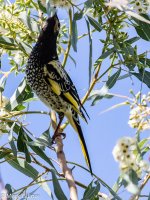The Forgotten Song


By luigi_pagano
- 2827 reads
Can anyone tell me
what has gone wrong?
The Regent Honeyeater
has forgotten his song.
In avian courtship, music
is extremely important;
in the absence of notes
the breeding is dormant
The females were used
to the dulcet tones
of trilling tenors
or bombastic baritones.
But things went awry;
now they suffer agony
listening to a chorus
of confusing cacophony.
Once abundant Down Under
now there are only a few
of these birds, feeding
on insects' honeydew.
The lack of old males
with whom to mix
means that a young chick
is truly in a fix.
He cannot learn how
to chirrup or to chirp
from a skilled teacher
and feels like a twerp.
The language he uses
to attract a young mate
is other birds' sounds
he learned to imitate.
It doesn't pass muster
and it is of no use.
It is not understood
and is bound to confuse.
Scientists believe that
birds must be retaught,
with old recordings,
the songs they forgot.
© Luigi Pagano (circa 2021)
- Log in to post comments
Comments
This was such a fun read
This was such a fun read—great rhythm and clever rhymes throughout! I especially loved the lines:
The language he uses
to attract a young mate
is other birds’ sounds
he learned to imitate.
That hit me like a metaphor for modern dating—how people often imitate what they think will work, but the “rizz” doesn’t always land. ![]() The last stanza also gave me Hunger Games vibes with the idea of using birds to preserve recordings. Beautifully done!
The last stanza also gave me Hunger Games vibes with the idea of using birds to preserve recordings. Beautifully done!
Jess <3
- Log in to post comments
That's so sad Luigi! I
That's so sad Luigi! I watched my blackbird yesterday evening as he sang on the roof of my house - the songs are really complex if you stop and listen - anyway, he's usually alone but his offspring have all fledged now and he had them sitting up on the chimney with him - it was so interesting and just as you describe in your poem!
- Log in to post comments
What a beautiful bird the
What a beautiful bird the Regent Honeyeater is. Musical tones must be so important in their courtship. I never realized there were very few old males left, that's so sad.
Your poem gives valid thought to this unfortunate bird Luigi.
Jenny. xx
- Log in to post comments
Thanks for this poem Luigi,
Thanks for this poem Luigi, it prompted me to google it and find there were only 300 now left to breed and pass on their song.
Dougie Moody
- Log in to post comments
Endangered.
This poem reminds me of one I wrote some time ago, about my favourite bird, the Blue Fairy Wren found in the South West of Western Australia. I lived in Manjimup near magnificent Karri trees where flashes of bright blue could be seen in the undergrowth. Local artists often paint them - the males, they're the colourful ones, the females are like your Royal Honeyeater, brown. Must confess I don't remember hearing their song... but I certainly enjoyed your words, Luigi, thank you and congratulations on your cherries.
Soundcloud: https://soundcloud.com/search?q=FrancesMF
- Log in to post comments
I should correct myself.
I should correct myself and give one of my favourite birds it's correct name: the Splendid Blue Wren found in the South-West Forrests in Western Australia but also variations of the same with slight differences in colour, also found in the Eastern States. Thank you again for your comments.
Best.
Soundcloud: https://soundcloud.com/search?q=FrancesMF
- Log in to post comments


